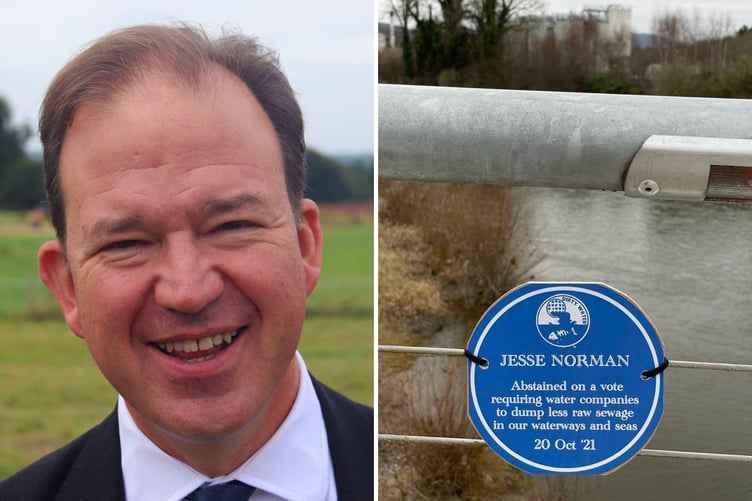Fines on polluters of the Wye should be reinvested in cleaning up the river, an MP and Government minister has urged.
In a letter published in last Thursday’s Times, Hereford and South Herefordshire MP Jesse Norman, whose constituency includes Welsh Newton, Llangarron, Llangrove, Whitchurch and Goodrich, wrote: “The Government has now said that all water fines will be reinvested into river restoration. Why not start with the Wye, one of the most glorious rivers in Britain?
The phosphate pollution in the river, which flows from the hills of mid-Wales through Herefordshire to the Severn estuary, “is partly the result of sewage discharges, but still more of agricultural run-off”, according to Mr Norman, who is Transport Minister with responsibility for decarbonisation and technology.
“It requires a collective approach, backed by central government.”
But he noted: “It has taken more than two years to assemble the cross-border, all-catchment group of agencies, local councils, Welsh Water and other parties needed to address the problem.”
His publication of the letter drew an instant volley of criticism, with 30 hostile responses in the first four hours, some accusing him of hypocrisy for having abstained from a vote in October 2021 on tougher measures to counter sewage pollution by water companies.
Proposed amendments to the Environment Bill, then passing though Parliament, would have placed a duty on water companies “to take all reasonable steps to ensure untreated sewage is not discharged from storm overflows”.
Monmouth MP and current Welsh Secretary David Davies also came under fire at the time for voting against the Lord’s amendment, having swum in the Wye weeks earlier with wild swimmer and campaigner Angela Jones to highlight the problem of pollution.
He said then that an immediate ban on any discharge of sewage into the river system could see sewage flooding back up the pipes into people’s homes during heavy rain.
Meanwhile, Local Extinction Rebellion protesters have installed “satirical” blue ‘Dirty Water’ plaques on bridges to highlight their campaign for tougher action to address the river’s “shocking state”.
One ‘dedicated’ to Mr Norman says: “Abstained on a vote requiring water companies to dump less raw sewage in our waterways and seas”.
Mr Norman did not respond when asked to comment on the plaque, but said at the time of the vote that he favoured “a long-term cross-border approach to clean up the river Wye” instead.
The Chancellor’s autumn statement last November anticipated a cut of nearly half a million pounds in real terms over the next two years to the budget of the Department for Environment, Food & Rural Affairs, which is responsible for river water quality.
Meanwhile, a study by the i newspaper, published this week, placed the Wye 14th nationally by number of hours in which sewage overflows were allowed to entre the river in 2021, at 13,359 hours.
The Wye was one of six rivers overseen by Dwr Cymru Welsh Water in the overflows top 20.
Top of the list was the River Severn, managed by Severn Trent Water, which saw nearly 29,000 hours of sewage discharges in 2021.
Earlier this month, Wye campaigner Angela Jones took her fight to Westminster when she spoke at a cross-party Welsh Affairs committee about the devastation the river has suffered, alongside chair of Surfers Against Sewage Jon Khoo and chief executive of River Trust Gail Davies-Walsh.

Comments
This article has no comments yet. Be the first to leave a comment.